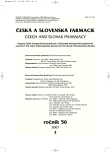Risk of drug interactions and their possible solutions in the population of patients with inflammatory bowell disease
Riziko lékových interakcí a jejich možná řešení v populaci pacientů s idiopatickým střevním zánětem
Současné užívání více léčivých přípravků je spojeno se zvýšeným rizikem výskytu lékových interakcí. Ve studii byla analyzována kompletní farmakoterapie 573 pacientů s diagnózou idiopatického střevního zánětu. Rozborem medikace testované kohorty pacientů byly identifikovány potenciální lékové interakce všech stupňů závažnosti. Všechny lékové interakce ve studii byly brány pouze jako potenciální, není tedy známo, že by způsobily pacientovi komplikace. Důležitým činitelem v procesu odhalování lékových interakcí může být farmaceut při dispenzaci v lékárně. Orientace farmaceuta v problematice lékových interakcí je součástí jeho odborné způsobilosti a měla by být stále intenzivně zvyšována v rámci postgraduálního vzdělávání. Studie se neomezuje jen na prosté konstatování výskytu potenciálních lékových interakcí. Je zaměřena i na management lékových interakcí ze strany lékaře a farmaceuta a snaží se naznačit cestu, jak této problematice čelit.
Klíčová slova:
lékové interakce – idiopatický střevní zánět – Crohnova choroba – ulcerózní kolitida
Authors:
P. Červený; J. Vlček; M. Lukáš 1
; M. Bortlík 1
Authors‘ workplace:
Karlova Univerzita v Praze, Farmaceutická fakulta v Hradci Králové, Katedra sociální a klinické
farmacie
; Univerzita Karlova, 1. lékařská fakulta a Všeobecná fakultní nemocnice v Praze, IV. interní klinika
Gastroenterologické centrum
1
Published in:
Čes. slov. Farm., 2007; 56, 77-84
Category:
Original Articles
Overview
Concurrent use of several medicinal preparations is connected with an increased risk of the occurrence of drug interactions. This study analyzes the complete pharmacotherapy of 573 patients diagnosed with inflammatory bowell disease. An analysis of the medication of the cohort of patients tested identified potential drug interactions of all degrees of gravity. All drug interactions in the study were considered to be only potential, and therefore they are not known to cause any complications for the patient. An important factor in the process of revealing drug interaction may be the pharmacist during dispensation in a pharmacy. Pharmacist’s expertise of the problems of drug interactions is a component of his/her professional competence and should be continuously intensively increased in postgraduate education. This study is not limited to simply stating the occurrence of potential drug interactions. It is also focused on the management of drug interactions from the party of the physician and the pharmacist and attempts to outline the way of encountering this problem.
Key words:
drug interactions – inflammatory bowell disease – Crohn’s disease – ulcerative colitis
Labels
Pharmacy Clinical pharmacologyArticle was published in
Czech and Slovak Pharmacy

2007 Issue 2
-
All articles in this issue
- Hypericin and hyperforin: bioactive components of St. John’s Wort (Hypericum perforatum) Their isolation, analysis and study of physiological effect
- Pellets preparation by the drug layering technique in a rotary processor
- Antioxidants, free radicals, mechanism of action and application in the therapy of the sulfur mustard caused injury
- Risk of drug interactions and their possible solutions in the population of patients with inflammatory bowell disease
- An orientational examination of the effects of extracts from mixtures of herbal drugs on selected renal functions
- Characterization of polyphenoloxidase from the latex of greater celandine (Chelidonium majus L.)
- Analysis of supplying situation in pharmacies II. Availability of medicaments and health appliances from the viewpoint of the patient
- Czech and Slovak Pharmacy
- Journal archive
- Current issue
- About the journal
Most read in this issue
- Hypericin and hyperforin: bioactive components of St. John’s Wort (Hypericum perforatum) Their isolation, analysis and study of physiological effect
- Pellets preparation by the drug layering technique in a rotary processor
- An orientational examination of the effects of extracts from mixtures of herbal drugs on selected renal functions
- Antioxidants, free radicals, mechanism of action and application in the therapy of the sulfur mustard caused injury
